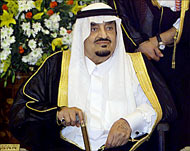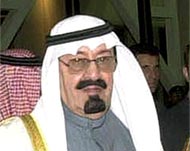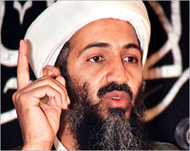Saudi issues new al-Qaida suspect list
Saudi Arabia says it has issued a list of 36 wanted people as part of a crackdown on al-Qaida’s network in the kingdom.

The authorities have been claiming success in their efforts to uproot insurgents who have carried out a series of bloody attacks in the past two years.
Security forces have killed or captured 23 out of 26 figures on the first wanted “terrorist” list put out in December 2003.
One of the most significant figures on the new list is Mohsen al-Fadhli, 24, a man Washington considers to be a leader in the al-Qaida network in the Gulf region.
It is the first word that al-Fadhli, a Kuwaiti, is believed to have been in Saudi Arabia and involved in attacks there.
In February, the US Treasury moved to freeze al-Fadhli’s finances, accusing him of providing financial and material support to networks run by Abu Musab al-Zarqawi, the Jordanian said to be responsible for scores of attacks in Iraq.
Attacks
Most of the men on the list, made public on Tuesday on the state news agency, are in their 20s.
Al-Fadhli is one of 21 people on the list that the Interior Ministry said are believed to have fled the kingdom after participating in attacks.
|
“In the past, Afghanistan was a refuge. Now that has been replaced with Iraq. They have no other place to go” Faris bin Hizam |
Faris bin Hizam, an expert on Saudi “terror” groups, said it is likely that many of the 21 have slipped into Iraq to fight alongside those battling Iraqi and US forces.
“In the past, Afghanistan was a refuge. Now that has been replaced with Iraq. They have no other place to go,” he said, adding that the Saudi government must now consider whether this group at-large is preparing for a comeback in Saudi Arabia.
Saudis have made up a significant part of the foreign mujahidin in the Iraqi campaign, including some believed to have carried out attacks.
But Interior Ministry spokesman Brigadier Mansour al-Turki said the suspects’ current whereabouts could not be sure.
Rewards
“It is very hard to speculate on whether they went to Iraq. We can’t assume that. Our records show they left the kingdom, but they could be anywhere,” he said.
He said that those who are outside the country were involved in terror acts and left before the authorities became aware of their involvement.
 |
|
Saudi dissidents say the House |
The ministry offered rewards of $267,000 for information leading to the arrest of any of the suspects.
The reward would be raised to $1.3 million if more than one suspect is arrested, and to $1.8 million if a terror act is foiled as a result of the information.
The list includes 29 Saudis, three Chadians, a Moroccan, a Kuwaiti, a Yemeni and a Mauritanian.
Younis Mohammed al-Hayari, a Moroccan and the only non-Saudi of the 15 thought to be inside the kingdom, is believed to have been closely associated with Abdul Karim al-Majati, a Moroccan killed in clashes in the kingdom in April.
Al-Qaida
Al-Majati was considered one of al-Qaida’s key operatives in Saudi Arabia and was wanted by the Saudis and the FBI.
Also remaining in Saudi Arabia is Fahd Faraaj al-Juwair, a 35-year-old who lost two brothers in clashes with Saudi forces last year.
He comes from a family known for its opposition to the Saudi government.
 |
|
Crown Prince Abdullah says the |
Another significant figure – listed as being abroad – is Saleh Saeed al-Btaih al-Ghamdi, a former member of the Saudi military said to have spent time in Afghanistan in the late 1990s.
Al-Ghamdi, 40, is believed to be a mid-level leader of the network, communicating between the top bosses and operatives, the experts said.
Saudi Arabia has suffered a series of heavy attacks since May 2003 when bombers attacked three housing estates for foreigners in the capital Riyadh.
House of Saud
After the attacks, the kingdom issued its first list of 26 most wanted suspects in December 2003 and launched a fierce wave of raids against anti-House of Saud groups.
That list also included foreigners in it, mainly Moroccans and Yemenis.
Those remaining from the first list include Saleh al-Aoofi, considered to be the top leader of al-Qaida’s branch in Saudi Arabia, and Talib Saud Abdullah al-Talib, both Saudis.
 |
|
Saudi-born Osama bin Laden has |
A third figure, Abdullah al-Roshoud – considered a top theologian – is said to have been killed in fighting with US forces in Iraq last week, according to a web statement issued by al-Zarqawi.
But Saudi authorities have not struck him from their list because his death has not been confirmed.
Saudi Arabia is the birthplace of the leader of the al-Qaida network, Osama bin Laden, and 16 of the 19 hijackers involved in the September 11 2001 attacks on the United States.
Saudi authorities say al-Qaida is trying to destabilise the country, but Saudi dissidents say the House of Saud is corrupt, dictatorial and beholden to the US.